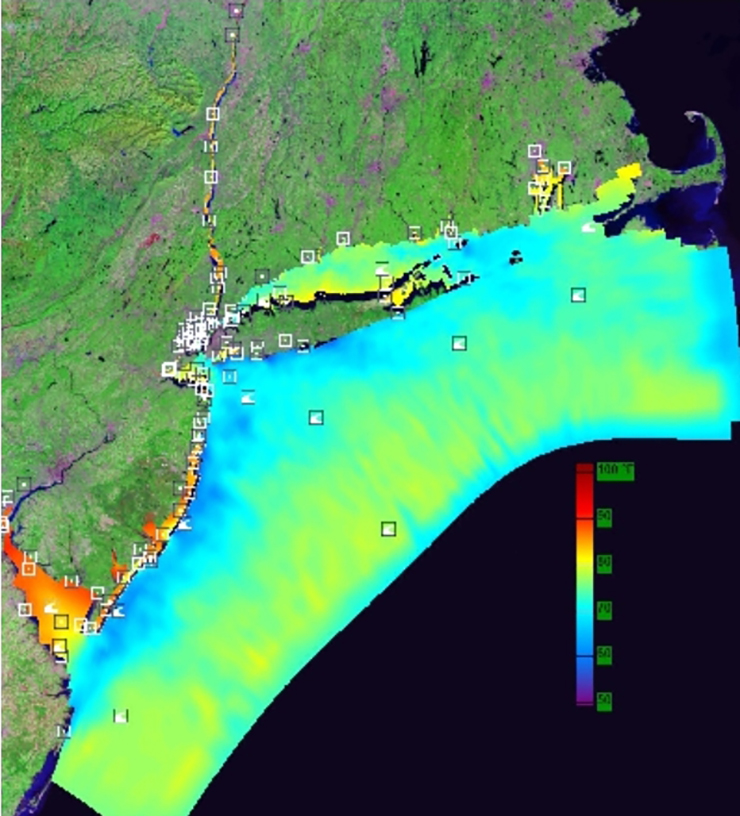By Meteorologist Joe Martucci
It’s the buzz of the shore towns, Facebook and, heck, even my own family: Why is the ocean so cold, Joe?
From July 1 to 22, 90% of days have reported a water temperature below 64.7 degrees, which is the June average, according to the National Oceanic and Atmospheric Administration (NOAA).
From Memorial Day to the Fourth of July, we expect the ocean to be cold. Water heats up slower than the land. It takes roughly four times as much energy (i.e. heating from the sun) to warm up a degree of water versus dry ground.
While New Jersey isn’t Miami, we do expect to be able to jump in the ocean without your lips turning blue a number of days in July, especially later in the month.
Not this year, thanks to upwelling.

Sea surface temperatures from July 18, 2024. Notice the blues right along the Jersey Shore. Those are ocean temperatures in the 60s, caused by upwelling (Stevens Institute of Technology).
What is upwelling?
Upwelling is when the typically warmer sea surface water moves away from the coast and out to sea. Colder water from the sea floor then rises to the top along the shoreline. This is a critical part of our marine ecosystem. That cold water is nutrient-rich and keeps our living ocean alive.
Upwelling is caused by “Ekman spiraling” according to the American Meteorological Society’s glossary.
I’ll save the meteorology for you. However, for the Jersey Shore, and the Northern Hemisphere, this means any time the coastline is to the left of the direction of the wind, upwelling occurs.
In our case, that means a wind from the southwest or south. The Jersey Shore is to the left of the air current. That causes Ekman spiraling, which pushes that warm water away.
From July 1 to 21, at Senator Frank S. Farley State Marina in Atlantic City, 15 of the days had a wind blowing from those two directions, according to the National Weather Service. Compare that to recent years for the same time period:
15 days in 2024
13 days in 2023
11 days in 2022
13 days in 2021 (two days were missing data, though)
To be fair, winds from the south and southwest are our dominant wind direction during the summer. However, we’ve seen more than usual recently, which leads to more upwelling.
Remember, too, that the wind from the south to southwest brings us the humidity. It brings the heat inland, too. Oftentimes, our hottest days on the mainland bring our chilliest water to the ocean.
Water temperatures have run below average
The average July water temperature is 68.9 degrees in Atlantic City, according to NOAA. Through July 22, the monthly average was 62.3 degrees.
So yes, it’s been frigid. Even as recently as Friday, water temperatures were in the 50s in Atlantic City.
From July 1 to 21, only four days beat the July average: July 3, 4, 5 and 9. The warmest was 71.8 degrees on July 9. That’s according to data retrieved by Jim Eberwine, who is a longtime National Weather Service meteorologist, the current Absecon emergency manager and my “weather dad.”
Note, too, that water temperatures have risen in Atlantic City. Compared to the 1912-2021 June to September average, the ocean has been above average every year since 2014.
When will it warm up?
Don’t expect widespread temperatures in the 70s until at least late next week, around Aug. 3.
The dominant wind direction will be from the south or southwest between now and then. The exception will be Friday and Saturday this weekend. Winds will be easterly, which will push that warmer water of the Gulf Stream to the Jersey Shore.
Climatology is on our side if you’re looking for a warmer ocean to swim in. The average August water temperature is 73.1 degrees in Atlantic City, according to NOAA. September is 72.2 degrees, which is why we love our “Locals’ Summer September”.
If you can’t wait, though, hop in the bays. Without the influence of upwelling, they’ve been plenty warm for weeks.
Shore Summer Weekend Weather Report Card
Despite the chilly ocean, 2024 rebounded back to our nice weekend weather ways! It passed last weekend’s exam nicely. I gave it a B+ for our shore’s weather.
Friday was awesome, and Sunday was really good, too. Saturday was the only downer. I was on the beach in Margate. It was fine, but it was cloudy and muggy. Plus, there were a few showers.
That keeps our summer 2024 grade point average at a 3.2. We’re on pace for the fourth-best summer weekend weather in the seven years I’ve done this.
Joe earned his Meteorology Degree from Rutgers University. He is approved by the American Meteorological Society as a Certified Broadcast Meteorologist and Certified Digital Meteorologist, the only one in the state with both. He’s won 10 New Jersey Press Association Awards. You can find him on social media @joemartwx













